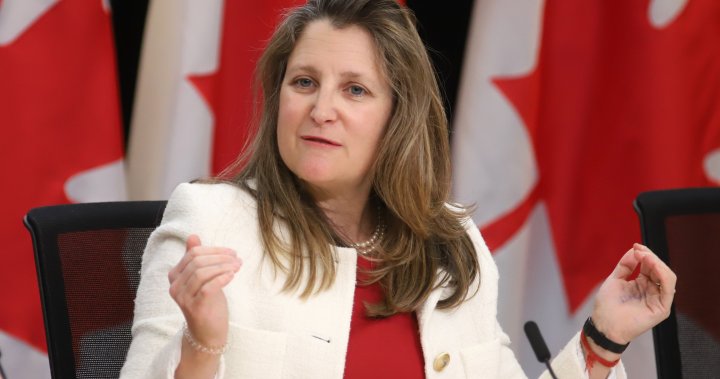Finance Minister Chrystia Freeland is preparing to present the federal budget in the House of Commons, focusing on addressing concerns about the cost of living among Canadians. The Liberal government has been unveiling parts of the budget during a pre-budget tour, with Prime Minister Justin Trudeau promising increased spending on housing, child care, military, and artificial intelligence. The new housing initiatives aim to build nearly 3.9 million homes by 2031, providing hope to younger Canadians who are struggling to achieve middle-class stability in today’s economy.
However, as the government plans to increase spending, attention is turning to the fiscal outlook and how they will manage the deficit. The government is under pressure to limit spending, especially with inflation above the Bank of Canada’s target. Finance Minister Freeland has pledged to adhere to new fiscal guidelines, including keeping the federal deficit below $40 billion for the 2023-24 fiscal year. The government may benefit from stronger economic growth, allowing for some fiscal flexibility, but new taxes may also be implemented to bridge the gap.
Recent polling shows that the majority of Canadians prefer the government to find savings elsewhere rather than raising taxes or running a larger deficit. However, there is support for a wealth tax on Canadians worth $10 million or more, with 78% of respondents in favor of such a measure. The federal budget comes at a crucial time for the Liberals, as they aim to regain support on affordability issues and counter the messaging from the Conservative Party, which has focused on housing and cost-of-living concerns.
Despite the challenges, the polling indicates a disconnect between Canadians’ perceptions of the government’s performance and their support for specific measures proposed by the Liberal government. While only a third of respondents believe the government is addressing middle-class issues and housing affordability, a majority support recent budget announcements, including increased infrastructure spending for housing and a national school food program. Finance Minister Freeland is set to present the federal budget in the House of Commons, aiming to address these key issues and win back support from Canadians.
In response to criticism from fiscal conservatives, the Liberal government is facing pressure to limit spending and manage the deficit carefully. Freeland has promised to adhere to new fiscal guardrails to ensure that deficits remain within certain limits and the debt-to-GDP ratio is manageable. The government will likely have some fiscal room due to stronger economic growth, but additional taxes may be necessary to cover new spending. The federal budget will be a crucial moment for the government to demonstrate their commitment to fiscal responsibility while addressing key concerns around affordability and economic stability.
As Freeland prepares to present the federal budget, the focus is on how the government plans to balance increased spending with fiscal responsibility. With public opinion divided on the best approach to covering new expenditures, the government faces the challenge of finding a solution that resonates with Canadians while also addressing key economic and social issues. The budget presentation will be a critical moment for the Liberal government to demonstrate their commitment to addressing the concerns of Canadians and securing support for their agenda.















